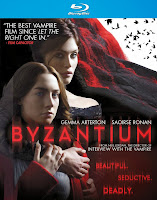the traveler's resource guide to festivals & films
a FestivalTravelNetwork.com site
part of Insider Media llc.
Reviews
CD Review: Paul McCartney—New (Hear Music)
- Details
- Parent Category: Film and the Arts
- Category: Reviews
- Published on Thursday, 07 November 2013 20:26
- Written by Kevin Filipski
Film Review: "Ender's Game"
- Details
- Parent Category: Film and the Arts
- Category: Reviews
- Published on Monday, 04 November 2013 18:30
- Written by Matt Oakes

"Ender's Game"
Directed by Gavin Hood
Starring Asa Butterfield, Harrison Ford, Viola Davis, Ben Kingsley, Moises Arias, Hailee Steinfeld, Abigail Breslin
Action, Adventure, Sci-Fi
114 Mins
PG-13
Ender, a natural born strategist, waxes philosophy like he's Sun Tzu. Taking "The Art of War" to its next logical step, Ender believes it's not enough to understand his enemy. For him, truly understanding your enemy comes hand-in-hand with loving them. When you know someone well enough to predict their moves militarily, you glimpse into their soul. All at once, this zen of inter-connectivity gives Ender an upper hand in battle but also puts him in a constantly state of moral dread. He knows he can be a mighty conqueror the likes of Caesar but doesn't know if he should be.
November '13 Digital Week I
- Details
- Parent Category: Film and the Arts
- Category: Reviews
- Published on Monday, 04 November 2013 05:11
- Written by Kevin Filipski
In a Town This Size
In honor of the 40th anniversary of Title IX—which made college sports gender-neutral—ESPN commissioned nine films by nine female directors to extol the achievements of women in sports, and the results are enlightening, exciting and even touching.
Shepard & Dark
American Ballet Theatre's Fall Season at Lincoln Center
- Details
- Parent Category: Film and the Arts
- Category: Reviews
- Published on Sunday, 03 November 2013 18:36
- Written by Jack Angstreich
The lamentable departure of New York City Opera from the precincts of Lincoln Center has had one surprising and welcome consequence — the invitation of other dance companies, besides the wonderful New York City Ballet, to perform there, often with live orchestral accompaniment.
As a result, New York dance enthusiasts have recently had the privilege to enjoy splendid performances at the Koch Theater by the Paul Taylor Dance Company, the Royal Ballet of Denmark, the National Ballet of Australia, the Paris Opera Ballet, and the San Francisco Ballet.
The announcement that American Ballet Theatre would move their fall season from City Center to Lincoln Center was delightful news. The new season of American Ballet Theatre, capping their terrific spring season at the Metropolitan Opera House, follows right on the heels of the fabulous appearance of the San Francisco Ballet, itself immediately succeeding New York City Ballet in its exciting fall season.
The program on the evening of Friday, November 1st, 2013, was a triumph, opening with the final, 1940 version of legendary choreographer Michel Fokine's exquisite 1909 work,Les Sylphides,a veritable time-capsule of 19th-century classical ballet, set to the lush piano music of Frederic Chopin.
Fokine's ballet is something of an hommage to the great Taglioni and Bournonville story-ballet, La Sylphide, but since Fokine choreographed for Diaghilev and for all its retrospective cast, Les Sylphides, in its abstraction, it looks forward to the peaks of high modernism as represented by such later figures as George Balanchine and Frederick Ashton.
The current performances are special for presenting the rediscovered, sparkling orchestration of Chopin's music by the estimable Benjamin Britten, just in time to coincide with this year's centennial of the composer's birth.
It was heard to magnificent effect under the baton of conductor David LaMarche. Standouts in the cast included, among others, the excellent ballerinas Hee Seo and Isabella Boylston but I'd also like to draw particular attention to the extraordinary precision of the corps de ballet here.
Twyla Tharp's hypnotic Bach Partita matched expectations and featured a strong cast including Marcelo Gomes, James Whiteside, Polina Semionova and, above all, Gillian Murphy.
Mark Morris's colorful, exuberant Gong, set to Colin McPhee's stunning proto-minimalist score from 1936 largely inspired by Indonesian gamelan music, Tabu-Tabuhan,concluded the program on an triumphant note. Morris's choreography engagingly references Indonesian dance forms and, in its central section, evokes Balinese shadow-plays, although two interludes without music produce an odd effect.. With its symphonic, often propulsive, approach to dance as endlessly self-renewing movement, the work is reminiscent of that of Twyla Tharp.
Gong,too, boasted a superb cast, with Gomes, Whiteside, Xiomara Reyes and Herman Cornejo — whose athleticism and agility here typify his consistent endurance as one of the strongest dancers in the company — as well as, once again, the outstanding Murphy, who dazzled with her solo in the final movement.
The program on the evening of Wednesday, November 6th opened with a repeat of the unutterably beautiful Les Sylphides,with the same — or at least substantially the same — cast. It was glorious to get a chance to see this again, a masterpiece that could surely sustain innumerable viewings. This was followed by José Limón's lovely The Moor's Pavane, subtitled "Variations on a Theme of Othello", another rare treasure from a bygone era of classic choreography, set to a magnificent score drawn from the work of the great Henry Purcell.
This piece is partly a witty pastiche of Renaissance and Baroque dance but, for all the levity of its ironic stance, it does achieve an authentic, unexpected note of tragic inexorability. The fine quartet of dancers here were Roman Zhurbin, Cory Stearns, Veronika Part and Hee Seo.
The program concluded with a repeat ofGong— although this time without Gomes — which, in its celebratory postmodernism, proved to be an elegant foil for the performative stylizations of The Moor's Pavane.
American Ballet Theatre
October 30 - November 10, 2013
20 Lincoln Center Plaza
New York, NY 10023
212 870 5520
www.abt.org
More Articles...
Newsletter Sign Up























